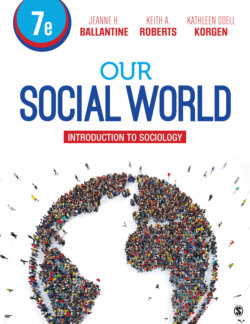Читать книгу Our Social World - Kathleen Odell Korgen - Страница 42
На сайте Литреса книга снята с продажи.
Questions Sociologists Ask—and Don’t Ask
ОглавлениеThink about this—everything a sociologist asks must be answerable through research. Perhaps you have had late-night discussions with your friends about the meaning of life, the existence of God, the ethical implications of genetically modified food, or the morality of abortion. These are philosophical issues that sociologists, like other scientists, cannot answer through scientific research. What sociologists do ask are questions about people in social groups and organizations—questions that can be studied scientifically. Sociologists may research how people feel about the previous issues (the percentage of people who want genetically modified food to be labeled, for example), but sociologists do not determine the right or wrong answers to such value-driven opinions. They are more interested in how people’s beliefs influence their behavior. They focus on issues that can be studied objectively and scientifically—looking for causes or consequences.
Sociologists might ask, Who gets an abortion, why do they do so, and how does the society, as a whole, view abortion? These are matters of fact that a social scientist can explore. However, sociologists avoid making ethical judgments about whether abortion is always acceptable, sometimes acceptable, or always wrong. In their private lives, sociologists and other scientists may have opinions on controversial philosophical issues, but these should not enter into their scientific work.
Likewise, sociologists might ask, What are the circumstances around individuals becoming drunk and acting drunk? This question is often tied more to the particular social environment than to the availability of alcohol. Note that a person might become intoxicated at a fraternity party but not at a family member’s wedding reception where alcohol is served. The expectations for behavior vary in each social setting. The researcher does not make judgments about whether use of alcohol is good or bad, or right or wrong, and avoids—as much as possible—opinions regarding responsibility or irresponsibility. The sociologist does, however, observe variations in the use of alcohol in different social situations and the resulting behaviors. The focus of sociology is on facts, what causes behaviors, and the results.
▲ Binge drinking, losing consciousness, vomiting, or engaging in sexual acts while drunk may be sources of storytelling at a college party but can be offensive at a wedding reception.
© iStock.com/shironosov
© Chris Ryan/Caiaimage/Getty Images
Thinking Sociologically
Consider the information you have just read. What are some questions sociologists might ask about drinking and drunkenness? What are some questions sociologists would not ask about these topics, at least while in their role as researchers?
